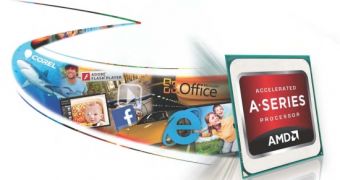The tablet market can be described as a river, one that has grown with each branded product vendor that decided to get involved in tablet manufacturing over the past couple of years. AMD intends to fully participate in the phenomenon, but not as a brand.
It might seem strange to say it that way, but that's actually part of the subtle charm possessed by the so-called battle plan that Advanced Micro Devices has cooked up, according to Leslie Sobon, corporate vice president, Worldwide Product & Outbound Marketing at AM.
Ever since the Apple iPad appeared, Intel, NVIDIA and Qualcomm, along with each and every notebook (ASUS and Lenovo for example) and smartphone makers (Huawei) willing to try their chances, have been aggressively promoting their brands, not just their products. Even bookstores are selling slates.
NVIDIA has the Tegra 3 ARM-based system-on-chip (SoC), Qualcomm has its Snapdragon, Intel has its Medfield (such as it is) and all three are doing all they can to have their labels strapped on devices.
AMD isn't going to bother overmuch with this. The company will just make contracts with product makers and provide them with good hardware and a “quality user experience.” As long as the direct buyers are happy with what they get to make, the Sunnyvale company doesn't really need consumers to know that yes, that tablet they have is AMD-powered.
This fits with what we learned back at IFA. AMD told us that, from their surveys and studies, consumers didn't really seem to care who made their tablet as long as it performed well.
Apple customers are an obvious exception to this, but that isn't indicative of their interest in branding as much as it is evidence of Apple customers being attached to the company's product ecosystem as a whole.
That many retailers and manufacturers don't even list many of the specs is another fact to consider.
In AMD's view, Intel has, so far, managed to dominate the CPU market through sheer size and capital. The tablet and phone market is a different battlefield though, and Windows 8 will cause a period of “chaos” during which its tablet customers will browse through all options rather than go with Intel because of familiarity.
There is also the lingering issue of whether or not Windows 8 on x86 tablets will truly prove better than Android / Windows RT on ARM ones. Intel's response to the reports about Windows 8 being buggy leaves room for interpretation too.
Finally, it bears noting that Advanced Micro Devices is getting involved in content delivery as well, not just hardware like Trinity A-Series APUs. The AMD AppZone was launched just today, complete with the AppZone Player that will be pre-loaded on devices form the very beginning, and which makes Android apps run on Windows as though that was their purpose all along.
Ironically, this will make certain that buyers know they have an AMD product even without the company being too proactive about it.

 14 DAY TRIAL //
14 DAY TRIAL //